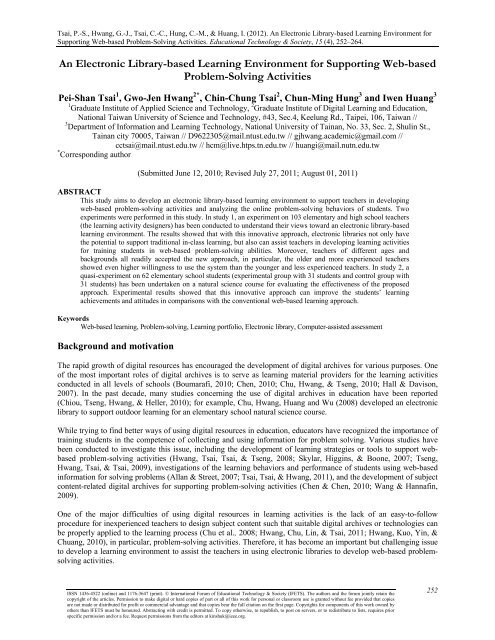October 2012 Volume 15 Number 4 - Educational Technology ...
October 2012 Volume 15 Number 4 - Educational Technology ...
October 2012 Volume 15 Number 4 - Educational Technology ...
You also want an ePaper? Increase the reach of your titles
YUMPU automatically turns print PDFs into web optimized ePapers that Google loves.
Tsai, P.-S., Hwang, G.-J., Tsai, C.-C., Hung, C.-M., & Huang, I. (<strong>2012</strong>). An Electronic Library-based Learning Environment for<br />
Supporting Web-based Problem-Solving Activities. <strong>Educational</strong> <strong>Technology</strong> & Society, <strong>15</strong> (4), 252–264.<br />
An Electronic Library-based Learning Environment for Supporting Web-based<br />
Problem-Solving Activities<br />
Pei-Shan Tsai 1 , Gwo-Jen Hwang 2* , Chin-Chung Tsai 2 , Chun-Ming Hung 3 and Iwen Huang 3<br />
1 Graduate Institute of Applied Science and <strong>Technology</strong>, 2 Graduate Institute of Digital Learning and Education,<br />
National Taiwan University of Science and <strong>Technology</strong>, #43, Sec.4, Keelung Rd., Taipei, 106, Taiwan //<br />
3 Department of Information and Learning <strong>Technology</strong>, National University of Tainan, No. 33, Sec. 2, Shulin St.,<br />
Tainan city 70005, Taiwan // D9622305@mail.ntust.edu.tw // gjhwang.academic@gmail.com //<br />
cctsai@mail.ntust.edu.tw // hcm@live.htps.tn.edu.tw // huangi@mail.nutn.edu.tw<br />
* Corresponding author<br />
(Submitted June 12, 2010; Revised July 27, 2011; August 01, 2011)<br />
ABSTRACT<br />
This study aims to develop an electronic library-based learning environment to support teachers in developing<br />
web-based problem-solving activities and analyzing the online problem-solving behaviors of students. Two<br />
experiments were performed in this study. In study 1, an experiment on 103 elementary and high school teachers<br />
(the learning activity designers) has been conducted to understand their views toward an electronic library-based<br />
learning environment. The results showed that with this innovative approach, electronic libraries not only have<br />
the potential to support traditional in-class learning, but also can assist teachers in developing learning activities<br />
for training students in web-based problem-solving abilities. Moreover, teachers of different ages and<br />
backgrounds all readily accepted the new approach, in particular, the older and more experienced teachers<br />
showed even higher willingness to use the system than the younger and less experienced teachers. In study 2, a<br />
quasi-experiment on 62 elementary school students (experimental group with 31 students and control group with<br />
31 students) has been undertaken on a natural science course for evaluating the effectiveness of the proposed<br />
approach. Experimental results showed that this innovative approach can improve the students’ learning<br />
achievements and attitudes in comparisons with the conventional web-based learning approach.<br />
Keywords<br />
Web-based learning, Problem-solving, Learning portfolio, Electronic library, Computer-assisted assessment<br />
Background and motivation<br />
The rapid growth of digital resources has encouraged the development of digital archives for various purposes. One<br />
of the most important roles of digital archives is to serve as learning material providers for the learning activities<br />
conducted in all levels of schools (Boumarafi, 2010; Chen, 2010; Chu, Hwang, & Tseng, 2010; Hall & Davison,<br />
2007). In the past decade, many studies concerning the use of digital archives in education have been reported<br />
(Chiou, Tseng, Hwang, & Heller, 2010); for example, Chu, Hwang, Huang and Wu (2008) developed an electronic<br />
library to support outdoor learning for an elementary school natural science course.<br />
While trying to find better ways of using digital resources in education, educators have recognized the importance of<br />
training students in the competence of collecting and using information for problem solving. Various studies have<br />
been conducted to investigate this issue, including the development of learning strategies or tools to support webbased<br />
problem-solving activities (Hwang, Tsai, Tsai, & Tseng, 2008; Skylar, Higgins, & Boone, 2007; Tseng,<br />
Hwang, Tsai, & Tsai, 2009), investigations of the learning behaviors and performance of students using web-based<br />
information for solving problems (Allan & Street, 2007; Tsai, Tsai, & Hwang, 2011), and the development of subject<br />
content-related digital archives for supporting problem-solving activities (Chen & Chen, 2010; Wang & Hannafin,<br />
2009).<br />
One of the major difficulties of using digital resources in learning activities is the lack of an easy-to-follow<br />
procedure for inexperienced teachers to design subject content such that suitable digital archives or technologies can<br />
be properly applied to the learning process (Chu et al., 2008; Hwang, Chu, Lin, & Tsai, 2011; Hwang, Kuo, Yin, &<br />
Chuang, 2010), in particular, problem-solving activities. Therefore, it has become an important but challenging issue<br />
to develop a learning environment to assist the teachers in using electronic libraries to develop web-based problemsolving<br />
activities.<br />
ISSN 1436-4522 (online) and 1176-3647 (print). © International Forum of <strong>Educational</strong> <strong>Technology</strong> & Society (IFETS). The authors and the forum jointly retain the<br />
copyright of the articles. Permission to make digital or hard copies of part or all of this work for personal or classroom use is granted without fee provided that copies<br />
are not made or distributed for profit or commercial advantage and that copies bear the full citation on the first page. Copyrights for components of this work owned by<br />
others than IFETS must be honoured. Abstracting with credit is permitted. To copy otherwise, to republish, to post on servers, or to redistribute to lists, requires prior<br />
specific permission and/or a fee. Request permissions from the editors at kinshuk@ieee.org.<br />
252

















